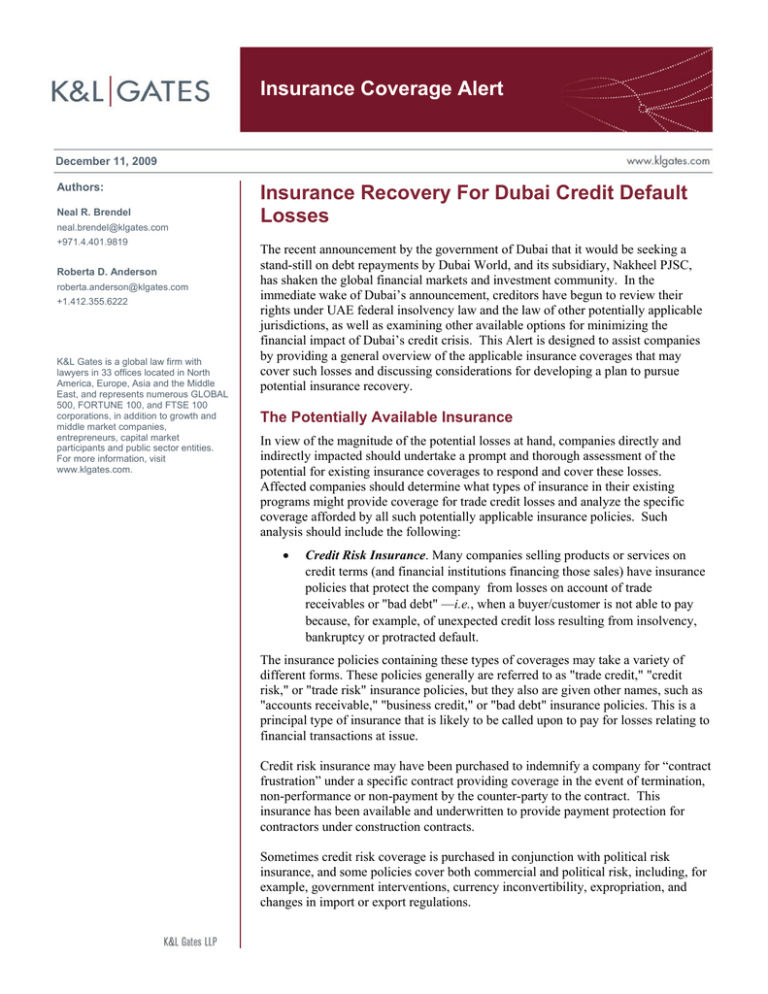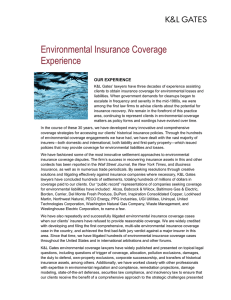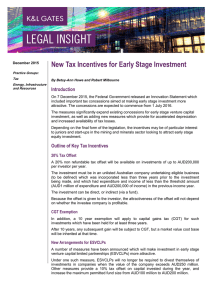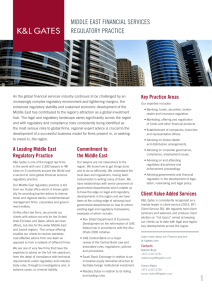
Insurance Coverage Alert
December 11, 2009
Authors:
Neal R. Brendel
neal.brendel@klgates.com
+971.4.401.9819
Roberta D. Anderson
roberta.anderson@klgates.com
+1.412.355.6222
K&L Gates is a global law firm with
lawyers in 33 offices located in North
America, Europe, Asia and the Middle
East, and represents numerous GLOBAL
500, FORTUNE 100, and FTSE 100
corporations, in addition to growth and
middle market companies,
entrepreneurs, capital market
participants and public sector entities.
For more information, visit
www.klgates.com.
Insurance Recovery For Dubai Credit Default
Losses
The recent announcement by the government of Dubai that it would be seeking a
stand-still on debt repayments by Dubai World, and its subsidiary, Nakheel PJSC,
has shaken the global financial markets and investment community. In the
immediate wake of Dubai’s announcement, creditors have begun to review their
rights under UAE federal insolvency law and the law of other potentially applicable
jurisdictions, as well as examining other available options for minimizing the
financial impact of Dubai’s credit crisis. This Alert is designed to assist companies
by providing a general overview of the applicable insurance coverages that may
cover such losses and discussing considerations for developing a plan to pursue
potential insurance recovery.
The Potentially Available Insurance
In view of the magnitude of the potential losses at hand, companies directly and
indirectly impacted should undertake a prompt and thorough assessment of the
potential for existing insurance coverages to respond and cover these losses.
Affected companies should determine what types of insurance in their existing
programs might provide coverage for trade credit losses and analyze the specific
coverage afforded by all such potentially applicable insurance policies. Such
analysis should include the following:
•
Credit Risk Insurance. Many companies selling products or services on
credit terms (and financial institutions financing those sales) have insurance
policies that protect the company from losses on account of trade
receivables or "bad debt" —i.e., when a buyer/customer is not able to pay
because, for example, of unexpected credit loss resulting from insolvency,
bankruptcy or protracted default.
The insurance policies containing these types of coverages may take a variety of
different forms. These policies generally are referred to as "trade credit," "credit
risk," or "trade risk" insurance policies, but they also are given other names, such as
"accounts receivable," "business credit," or "bad debt" insurance policies. This is a
principal type of insurance that is likely to be called upon to pay for losses relating to
financial transactions at issue.
Credit risk insurance may have been purchased to indemnify a company for “contract
frustration” under a specific contract providing coverage in the event of termination,
non-performance or non-payment by the counter-party to the contract. This
insurance has been available and underwritten to provide payment protection for
contractors under construction contracts.
Sometimes credit risk coverage is purchased in conjunction with political risk
insurance, and some policies cover both commercial and political risk, including, for
example, government interventions, currency inconvertibility, expropriation, and
changes in import or export regulations.
Insurance Coverage Alert
Trade credit insurance can be underwritten to cover
domestic business, export business, or
both. Likewise, policies may cover an entire
business or may be targeted to cover only certain
accounts, certain product lines, or sales to certain
countries.
In assessing coverage, it is important to note that
trade credit or credit risk insurance can be complex,
and policy wordings differ substantially.
some of these procedures may have timing
deadlines associated with them. Moreover, the
manner in which a claim is presented can sometimes
have an impact on the ultimate recovery. Among
other things, companies aware of a loss relating to
the current situation should act promptly to
maximize any insurance recovery by taking the
following actions.
•
Provide Timely Notice Under All
Potentially Applicable Policies. Many
insurance policies, including trade credit
insurance policies, contain “notice”
provisions that require companies to act
quickly in order to protect their rights to
coverage. Failure to strictly comply with
time and notice requirements may result in
a denial of coverage. Accordingly,
companies should promptly provide notice
of loss to all potentially responsible
insurers, even if the full details remain
unknown. The notice can be supplemented
at a later date.
•
Timely Submit Any Required Proof Of
Loss. Many insurance policies, including
trade credit insurance policies, state a
specific time period within which a sworn
proof of loss must be submitted. Failure to
submit a timely sworn proof of loss may
result in a denial of coverage. Again, the
initial submission may be supplemented, if
the full details of the loss remain unknown
by the policy deadline.
•
Pay Attention To Policy Warranties And
Conditions. Insurance policies generally
contain policy conditions, such as the
“notice” and “proof of loss” conditions
discussed above. Some insurance policies
include express “warranties.” Trade credit
insurance policies, for example, may
contain a warranty stating that the company
will not agree to an alteration to the terms
and conditions of the insured contract including payment terms. Companies
should pay attention to conditions and
warranties, since violations of these terms
(such as renegotiating payment terms), as
with any of the terms of the contract, may
Companies that have purchased trade credit or credit
risk insurance should seek to take advantage of the
coverage the policies may provide by undertaking a
careful review and examination of the specific
policy wordings, looking for insuring language that
may provide a path to coverage.
•
•
Coverage Under Other Types Of Insurance
Policies. Although credit risk insurance
policies may be the main sources of
coverage for losses arising from payment
defaults by counterparties in business
transactions, affected companies should
check all relevant insurance policies for
potential coverage. For example, there may
be surety bonds that insure against nonperformance of a contract by other parties.
“Additional Insured” Coverage.
Companies also should determine if
“additional insured” coverage is available.
Many insurance policies provide
coverage, not only to the company that
purchased the insurance, but also to
“additional insureds” — typically other
companies with whom the “named
insured” does business. Accordingly, the
analysis of available insurance should not
end with the affected company’s own
policies, but also should include
consideration of the potential for coverage
under insurance policies purchased by
others involved in financial transactions at
issue.
Protecting And Maximizing Coverage
Most insurance policies purport to identify specific
procedures that should be followed in presenting a
claim (notice, proof of loss, suit limitation, etc.), and
December 11, 2009
2
Insurance Coverage Alert
serve as the basis for insurers attempting to
nullify the coverage.
•
Identify Earliest Date For Filing Suit.
Many insurance policies contain a specific
“suit limitation” provision that provides a
specific date by which suit must be filed.
Failure to file a timely lawsuit may serve as
the basis for insurers to deny coverage.
Policies in general have suit limitation
provisions ranging from 1 to 3 years,
compared to much longer statutory
limitations periods applicable to other types
of contracts.
•
Identify And Understand Arbitration
Provisions. Many insurance policies,
including many trade credit insurance
policies, contain mandatory arbitration
provisions, often coupled with choice-oflaw clauses that specify the law of the
jurisdiction to govern any dispute. These
provisions must be carefully analyzed to
determine how coverage rights under the
policy may be interpreted and enforced
under the specified law and arbitration
procedure.
•
Challenge A Denial Of Coverage. Insurers
frequently issue an initial denial for a claim
whenever there is any plausible basis for
doing so. Rarely is it wise to accept an
insurer’s opinion about what may or may
not be covered, or to accept initial denial of
a substantial claim, without first consulting
with lawyers experienced in acting on
behalf of corporate insurance policyholders.
Although policyholders may be required to
aggressively pursue their insurance claims,
and even litigate or arbitrate, to ensure they
receive the benefits of the coverage they
purchased, it may be possible to obtain
significant coverage despite initial
resistance by insurers to pay claims. Nor
does a coverage denial necessarily mean
litigation or arbitration. Sometimes careful
presentation of a claim followed by forceful
negotiations are enough pushback to cause
an insurer to reconsider its coverage
position.
Assessing The Adequacy Of
Insurance For Future Claims
As the recent Dubai-related events illustrate, shaken
prosperity reveals unsuspected threats. The risk of
loss can be addressed in corporate insurance
programs. As part of an overall and comprehensive
evaluation of their insurance programs, companies
should evaluate their trade credit insurance, if any,
and may wish to consider the potential benefits of
purchasing such coverage – in addition to analyzing
the adequacy of their insurance programs as a
whole. Companies should remember that specific
policy wording and insurance limits may have a
significant impact on the scope of insurance
recovery. Lawyers experienced in acting on behalf
of insureds can assist companies in evaluating the
strengths and weaknesses of their current insurance
programs and in negotiating the terms and
conditions of new and renewal coverages to
improve the scope of coverage.
Conclusion
No potential asset of a company should be
overlooked to respond to losses occasioned by the
current financial crisis. An effective strategy for
pursuing insurance coverage for losses at issue must
be based on the specific facts of each individual
situation, the specific insurance coverages
purchased, policy language and applicable law.
With the assistance of experienced lawyers,
companies facing actual or potential trade credit
losses in the wake of the current worldwide
economic recession will be in the best possible
position to maximize available insurance coverage
to respond to such losses.
December 11, 2009
3
Insurance Coverage Alert
Anchorage Austin Beijing Berlin Boston Charlotte Chicago Dallas Dubai Fort Worth Frankfurt Harrisburg Hong Kong London
Los Angeles Miami Newark New York Orange County Palo Alto Paris Pittsburgh Portland Raleigh Research Triangle Park
San Diego San Francisco Seattle Shanghai Singapore Spokane/Coeur d’Alene Taipei Washington, D.C.
K&L Gates is a global law firm with lawyers in 33 offices located in North America, Europe, Asia and the Middle East, and represents numerous
GLOBAL 500, FORTUNE 100, and FTSE 100 corporations, in addition to growth and middle market companies, entrepreneurs, capital market
participants and public sector entities. For more information, visit www.klgates.com.
K&L Gates comprises multiple affiliated partnerships: a limited liability partnership with the full name K&L Gates LLP qualified in Delaware and
maintaining offices throughout the United States, in Berlin and Frankfurt, Germany, in Beijing (K&L Gates LLP Beijing Representative Office), in
Dubai, U.A.E., in Shanghai (K&L Gates LLP Shanghai Representative Office), and in Singapore; a limited liability partnership (also named K&L
Gates LLP) incorporated in England and maintaining offices in London and Paris; a Taiwan general partnership (K&L Gates) maintaining an office in
Taipei; and a Hong Kong general partnership (K&L Gates, Solicitors) maintaining an office in Hong Kong. K&L Gates maintains appropriate
registrations in the jurisdictions in which its offices are located. A list of the partners in each entity is available for inspection at any K&L Gates office.
This publication is for informational purposes and does not contain or convey legal advice. The information herein should not be used or relied upon
in regard to any particular facts or circumstances without first consulting a lawyer.
©2009 K&L Gates LLP. All Rights Reserved.
December 11, 2009
4





